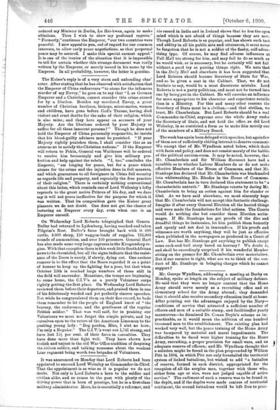The Kaiser's reply is of a very stern and unbending
char- acter. After stating that be has observed with satisfaction that the Emperor of China endeavours "to atone for the infamous murder of my Envoy," he goes on to say that "I, as German Emperor and a Christian, cannot consider this crime atoned for by a libation. Besides my murdered Envoy, a great number of Christian brethren, bishops, missionaries, women and children, have gone before God's Throne, having died violent and cruel deaths for the sake of their religion, which is also mine; and they here appear as accusers of your Majesty. Are the libations ordered by your Majesty to suffice for all these innocent persons ? " Though he does not hold the Emperor of China personally responsible, he insists that his blood-guilty advisers must be punished. "If your Majesty rightly punishes them, I shall consider this as an atonement to satisfy the Christian nations." If the Emperor will return to Pekin, General von Waldersee will be ordered to receive him becomingly and give him military pro- tection and help against the rebels. "I, too," concludes the Emperor, "am longing for peace, but for a peace which atones for the crime and the injustice done in fall measure, and which guarantees to all foreigners in China full security as regards life and property, and especially the free practice of their religion." There is certainly nothing conventional about this letter, which reminds one of Lord Wellesley's lofty reproofs to the great native Princes of his day, and we dare say it will not prove ineffective for the purpose for which it was written. That its composition gave the Kaiser great pleasure we do not doubt. One does not get the chance of lecturing an Emperor every day, even when one is an Emperor oneself.


















































 Previous page
Previous page